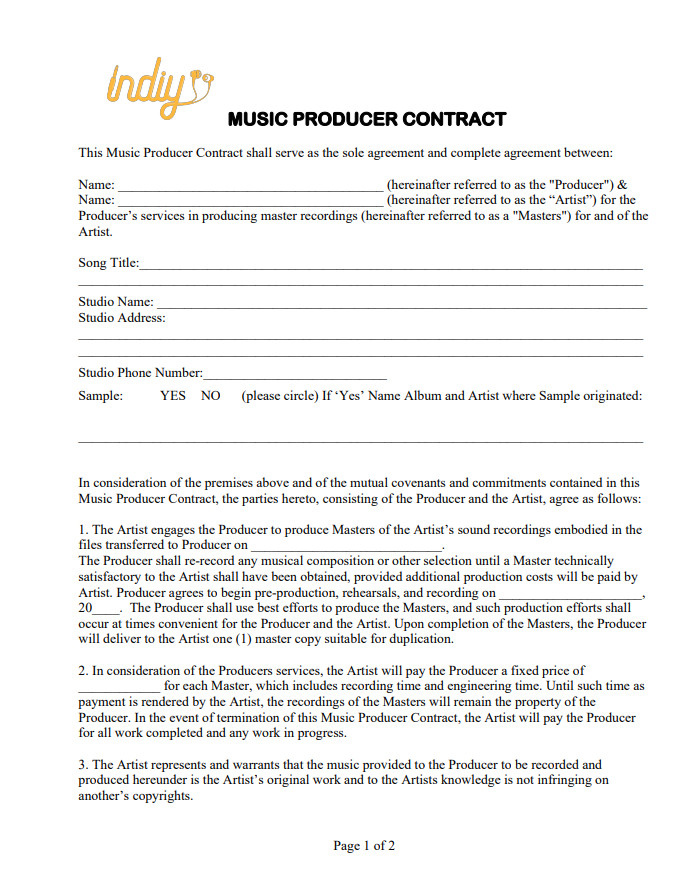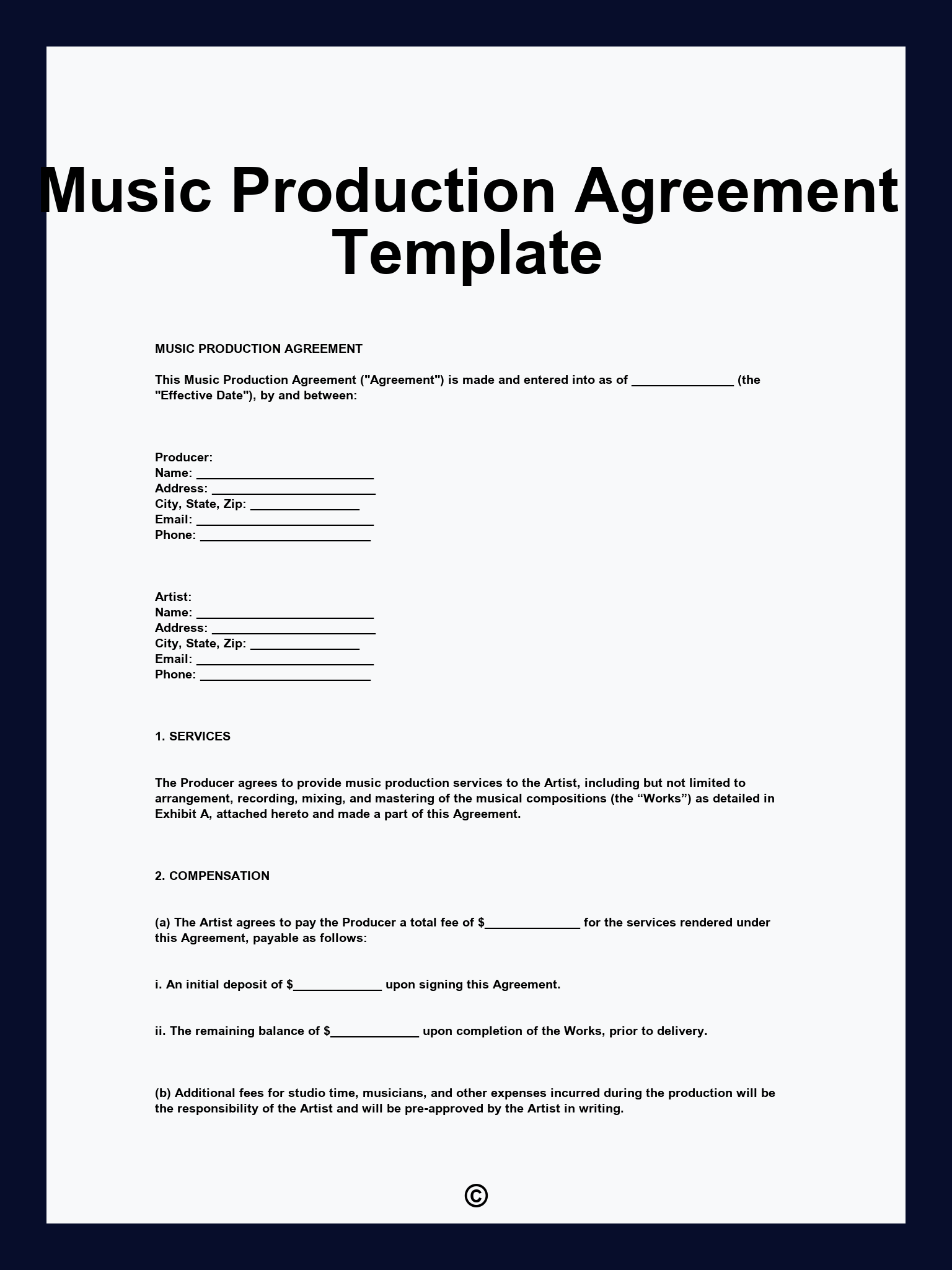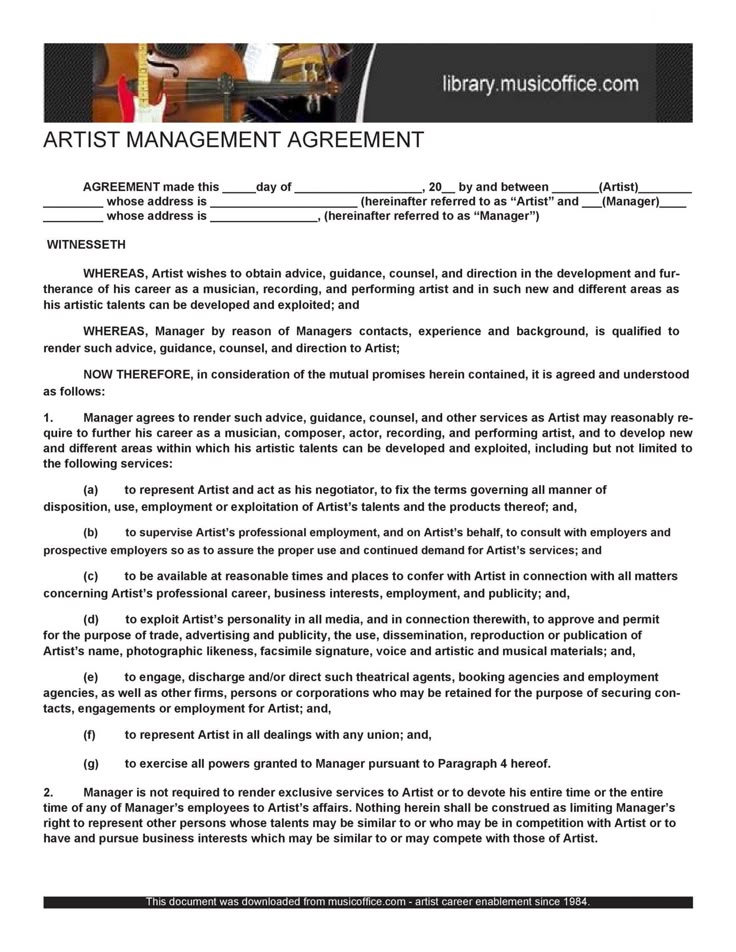
Are you a music producer looking to collaborate with artists and other industry professionals? If so, having a clear and concise music production agreement is crucial for protecting your rights and ensuring a smooth working relationship.
In this guide, we will explore the ins and outs of music production agreements, covering everything from what they are to how to create one effectively. Whether you are a seasoned producer or just starting, this article will provide you with all the information you need to navigate the world of music production agreements.
What is a Music Production Agreement?
A music production agreement is a legal document that outlines the terms and conditions of a collaboration between a music producer and an artist or other industry professionals. This agreement typically covers important details such as ownership rights, payment terms, royalties, credits, and confidentiality clauses. By having a written agreement in place, both parties can ensure that their rights and responsibilities are clearly defined, reducing the risk of misunderstandings or disputes down the line.
When creating a music production agreement, it is essential to consider the specific needs and expectations of all parties involved. This includes determining the scope of work, deadlines, and any additional services or deliverables that may be required. Additionally, it is important to consult with a legal professional to ensure that the agreement complies with relevant laws and regulations in your jurisdiction.
Why Use a Music Production Agreement?
Music production agreements offer a range of benefits for both music producers and artists. Some of the key reasons to use a written agreement include:
- Clarity: A written agreement clearly outlines the expectations and responsibilities of all parties involved, reducing the risk of misunderstandings or conflicts.
- Protection: By detailing ownership rights, payment terms, and other important provisions, a music production agreement helps protect the interests of both the producer and the artist.
- Professionalism: Using a formal agreement demonstrates professionalism and commitment to the collaboration, which can help build trust and credibility with potential partners.
- Legal Compliance: A well-drafted agreement can help ensure that the collaboration complies with relevant laws and regulations, reducing the risk of legal issues in the future.
In the competitive and fast-paced world of music production, having a solid agreement in place can give you the peace of mind and security you need to focus on creating great music.
How to Create a Music Production Agreement
Creating a music production agreement may seem daunting, but with the right approach and guidance, it can be a straightforward process. Here are some key steps to follow when drafting your agreement:
1. Define the Scope of Work: Clearly outline the services to be provided, including production, recording, mixing, mastering, and any additional services.
2. Establish Payment Terms: Specify the payment structure, including fees, royalties, advances, and any other financial arrangements.
3. Detail Ownership Rights: Determine who will own the rights to the music, including copyrights, master recordings, and publishing rights.
4. Include Credits and Royalties: Outline how credits will be given and how royalties will be distributed, including any mechanical royalties, performance royalties, or other income streams.
5. Address Confidentiality: Include clauses to protect confidential information, trade secrets, and other sensitive data shared during the collaboration.
6. Set Deadlines and Deliverables: Establish clear deadlines for the completion of work, and outline any deliverables that are expected from both parties.
7. Consult with Legal Professionals: Seek advice from a legal professional to ensure that your agreement is comprehensive, enforceable, and compliant with relevant laws.
By following these steps and tailoring the agreement to meet the specific needs of your collaboration, you can create a music production agreement that protects your interests and sets the stage for a successful partnership.
Examples of Music Production Agreements
To help you get started, here are a few examples of music production agreements that you can use as a template or reference when creating your own:


Tips for Successful Music Production Agreements
When creating a music production agreement, keep the following tips in mind to ensure a smooth and successful collaboration:
- Communicate Clearly: Ensure that all terms and expectations are communicated and understood by all parties involved.
- Be Flexible: Be open to negotiation and compromise to find mutually beneficial solutions for any disagreements or conflicts.
- Review Regularly: Periodically review and update the agreement to reflect any changes in the collaboration or industry standards.
- Seek Legal Advice: Consult with a legal professional to review and finalize the agreement, ensuring that it is legally sound and enforceable.
- Maintain Good Relationships: Building trust and maintaining positive relationships with collaborators can help prevent disputes and ensure a successful partnership.
- Document Everything: Keep detailed records of all communications, agreements, and transactions related to the collaboration to protect yourself in case of disputes.
- Stay Informed: Stay up to date on industry trends, regulations, and best practices to ensure that your agreement remains relevant and effective.
By following these tips and best practices, you can create a music production agreement that sets the foundation for a successful and rewarding collaboration in the music industry.
In Conclusion
In conclusion, music production agreements are essential tools for protecting your rights, ensuring clarity and professionalism, and building successful collaborations in the music industry. By understanding what these agreements are, why they are important, and how to create them effectively, you can navigate the complexities of music production with confidence and security.
Whether you are a producer, artist, or industry professional, having a well-drafted agreement in place can help you achieve your creative and financial goals while minimizing risks and conflicts. So don’t wait any longer – start creating your music production agreement today and lay the groundwork for a successful musical journey.
Music Production Agreement Template – Download